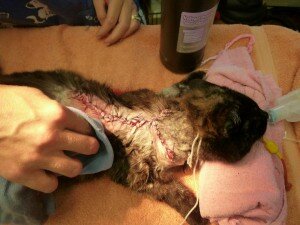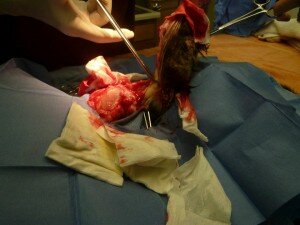
Ms. Kitty after surgery
Note: this post contains graphic photos of the removal of a large injection-site tumor (a vaccine-associated sarcoma) from a stray cat, Ms. Kitty.
Jill Kirsh of Cripple Creek Ferals and Friends writes: I operate a cat rescue focusing on TNR (trap, neuter, return) and special needs animals. I received a call about a stray cat “missing an eye with a lump on her side.” Her lump turned out to be a VAS: vaccine-associated sarcoma, also call FISS, feline injection-site sarcoma.
I was not even able to cup my hand around the tumor; it had erupted. She was immediately taken to the local vet and was told there was nothing that could be done, that surgery was not recommended. I opted for a second opinion with my former vet who now practices an hour away. He promptly declared the lump needed to come off if we wanted to try to save her. Surgery was scheduled for the following day.
As you can see from the photos, the incision was quite extensive. The incision began to open up between her shoulders and several visits to the local vet as well as the emergency clinic resulted in a “nothing can be done” response.
Another hour long trip to the surgeon and Ms. Kitty was stitched back up and is doing as well as can be expected. She has had urinary issues as far as urinating a lot with blood in it. Two urinalysis finally showed an infection. The surgeon believes a stone caused the bleeding and surgery is not an option. Her urine seems to be clearing up somewhat. All of her bloodwork came back normal, thyroid levels normal and no diabetes.
Ms. Kitty has proven what a little survivor she is! I know a lot of people felt she should have been euthanized but she has been worth every minute of worry and frustration! I hope Ms. Kitty finally understands the love, warmth and compassion her humans feel for her.
Update 9/26/12: She went to the vet today and is now on different antibiotics to hopefully help with the blood in the urine and also to help the incision heal. The vet fears that if there is no improvement in a couple days the tumor may be coming back already. I sincerely hope that is not the case; she has come so far!
Another update: She went to the vet yesterday (different one) and is on different antibiotics, pain meds and cosequin to help with the inflammation of the UTI. She peed clear today! The incision is not doing well and the vet is worried if she does not respond to the new drugs that the tumor may be returning already. I certainly hope she is wrong!
9/28/12: Finally!! Some good news to report on Ms. Kitty! (I hope I am not jinxing it!) She is peeing normal amounts of clear urine in the box! Her incision is looking much better but when she moves it “squeaks” or sounds like a fart. Making a call to the vet to make sure that is ok? She still has some drainage (clear) from it but nowhere near as much as before. Her appetite is great and much more active. You can tell she feels better! Hope it continues!
See more photos on Jill Kirsh’s Facebook page. Surgery photos: https://www.facebook.com/media/set/?set=a.496967936997425.123843.100000526683577&type=1&l=6695bbc9f5 Photos when I first got her: https://www.facebook.com/media/set/?set=a.495164653844420.123265.100000526683577&type=1&l=9291de0887


Tumor being removed from Ms. Kitty







